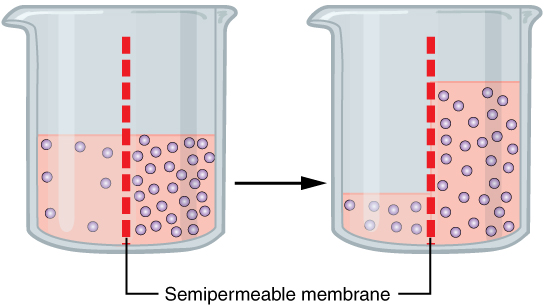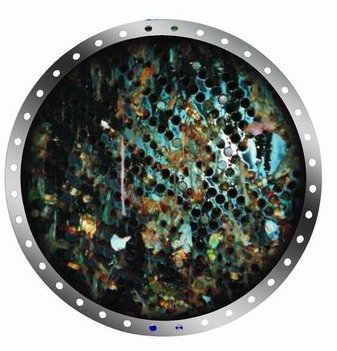|
Forward Osmosis
Forward osmosis (FO) is an osmotic process that, like reverse osmosis (RO), uses a semi-permeable membrane to effect separation of water from dissolved solutes. The driving force for this separation is an osmotic pressure gradient, such that a "draw" solution of high concentration (relative to that of the feed solution), is used to induce a net flow of water through the membrane into the draw solution, thus effectively separating the feed water from its solutes. In contrast, the reverse osmosis process uses hydraulic pressure as the driving force for separation, which serves to counteract the osmotic pressure gradient that would otherwise favor water flux from the permeate to the feed. Hence significantly more energy is required for reverse osmosis compared to forward osmosis. The simplest equation describing the relationship between osmotic and hydraulic pressures and water (solvent) flux is: where J_w is water flux, A is the hydraulic permeability of the membrane, Δπ is t ... [...More Info...] [...Related Items...] OR: [Wikipedia] [Google] [Baidu] |
Osmotic Processes Diagram
Osmosis (, ) is the spontaneous net movement or diffusion of solvent molecules through a selectively-permeable membrane from a region of high water potential (region of lower solute concentration) to a region of low water potential (region of higher solute concentration), in the direction that tends to equalize the solute concentrations on the two sides. It may also be used to describe a physical process in which any solvent moves across a selectively permeable membrane (permeable to the solvent, but not the solute) separating two solutions of different concentrations. Osmosis can be made to do work. Osmotic pressure is defined as the external pressure required to be applied so that there is no net movement of solvent across the membrane. Osmotic pressure is a colligative property, meaning that the osmotic pressure depends on the molar concentration of the solute but not on its identity. Osmosis is a vital process in biological systems, as biological membranes are semiper ... [...More Info...] [...Related Items...] OR: [Wikipedia] [Google] [Baidu] |
Concentration
In chemistry, concentration is the abundance of a constituent divided by the total volume of a mixture. Several types of mathematical description can be distinguished: '' mass concentration'', ''molar concentration'', '' number concentration'', and '' volume concentration''. The concentration can refer to any kind of chemical mixture, but most frequently refers to solutes and solvents in solutions. The molar (amount) concentration has variants, such as normal concentration and osmotic concentration. Etymology The term concentration comes from the word concentrate, from the French , from con– + center, meaning “to put at the center”. Qualitative description Often in informal, non-technical language, concentration is described in a qualitative way, through the use of adjectives such as "dilute" for solutions of relatively low concentration and "concentrated" for solutions of relatively high concentration. To concentrate a solution, one must add more solute (for exam ... [...More Info...] [...Related Items...] OR: [Wikipedia] [Google] [Baidu] |
Landfill
A landfill site, also known as a tip, dump, rubbish dump, garbage dump, or dumping ground, is a site for the disposal of waste materials. Landfill is the oldest and most common form of waste disposal, although the systematic burial of the waste with daily, intermediate and final covers only began in the 1940s. In the past, refuse was simply left in piles or thrown into pits; in archeology this is known as a midden. Some landfill sites are used for waste management purposes, such as temporary storage, consolidation and transfer, or for various stages of processing waste material, such as sorting, treatment, or recycling. Unless they are stabilized, landfills may undergo severe shaking or soil liquefaction of the ground during an earthquake. Once full, the area over a landfill site may be reclaimed for other uses. Operations Operators of well-run landfills for non-hazardous waste meet predefined specifications by applying techniques to: # confine waste to as small an area ... [...More Info...] [...Related Items...] OR: [Wikipedia] [Google] [Baidu] |
Desalination
Desalination is a process that takes away mineral components from saline water. More generally, desalination refers to the removal of salts and minerals from a target substance, as in soil desalination, which is an issue for agriculture. Saltwater (especially sea water) is desalinated to produce water suitable for human consumption or irrigation. The by-product of the desalination process is brine. Desalination is used on many seagoing ships and submarines. Most of the modern interest in desalination is focused on cost-effective provision of fresh water for human use. Along with recycled wastewater, it is one of the few rainfall-independent water resources. Due to its energy consumption, desalinating sea water is generally more costly than fresh water from surface water or groundwater, water recycling and water conservation. However, these alternatives are not always available and depletion of reserves is a critical problem worldwide. Desalination processes are using eith ... [...More Info...] [...Related Items...] OR: [Wikipedia] [Google] [Baidu] |
Forward Osmosis For Evaporative Cooling Tower Make-up
Forward is a relative direction, the opposite of backward. Forward may also refer to: People * Forward (surname) Sports * Forward (association football) * Forward (basketball), including: ** Point forward ** Power forward (basketball) ** Small forward * Forward (ice hockey) ** Power forward (ice hockey) * In rugby football: ** Forwards (rugby league), in rugby league football ** Forwards (rugby union), in rugby union football * Forward Sports, a Pakistan sportswear brand * BK Forward, a Swedish club for association football and bandy Politics * Avante (political party) (Portuguese for ''forward''), a political party in Brazil * Forward (Belgium), a political party in Belgium * Forward (Denmark), a political party in Denmark * Forward (Greenland), a political party in Greenland * Forward Party (United States), a centrist American political party * Kadima (Hebrew for ''forward''), a political party in Israel * La République En Marche! (sometimes translated as ''Forward!' ... [...More Info...] [...Related Items...] OR: [Wikipedia] [Google] [Baidu] |
National Geographic (magazine)
''National Geographic'' (formerly the ''National Geographic Magazine'', sometimes branded as NAT GEO) is a popular American monthly magazine published by National Geographic Partners. Known for its photojournalism, it is one of the most widely read magazines of all time. The magazine was founded in 1888 as a scholarly journal, nine months after the establishment of the society, but is now a popular magazine. In 1905, it began including pictures, a style for which it became well-known. Its first color photos appeared in the 1910s. During the Cold War, the magazine committed itself to present a balanced view of the physical and human geography of countries beyond the Iron Curtain. Later, the magazine became outspoken on environmental issues. Since 2019, controlling interest has been held by The Walt Disney Company. Topics of features generally concern geography, history, nature, science, and world culture. The magazine is well known for its distinctive appearance: a thick s ... [...More Info...] [...Related Items...] OR: [Wikipedia] [Google] [Baidu] |
Modern Water
Modern Water plc is a British company ''Bloomberg Business Week''. which was first listed on the AIM submarket of the on the 12 June 2007. It owns, installs and operates advanced membrane technologies and develops and supplies systems for water monitoring. In December 2011, the company completed its acquisition of the water quality division of Strategic Diagnostics Inc. ("SDIX"), including its Microtox toxicity testing technology. Divisions Membrane Process Division [...More Info...] [...Related Items...] OR: [Wikipedia] [Google] [Baidu] |
Fouling
Fouling is the accumulation of unwanted material on solid surfaces. The fouling materials can consist of either living organisms ( biofouling) or a non-living substance (inorganic or organic). Fouling is usually distinguished from other surface-growth phenomena in that it occurs on a surface of a component, system, or plant performing a defined and useful function and that the fouling process impedes or interferes with this function. Other terms used in the literature to describe fouling include deposit formation, encrustation, crudding, deposition, scaling, scale formation, slagging, and sludge formation. The last six terms have a more narrow meaning than fouling within the scope of the fouling science and technology, and they also have meanings outside of this scope; therefore, they should be used with caution. Fouling phenomena are common and diverse, ranging from fouling of ship hulls, natural surfaces in the marine environment ( marine fouling), fouling of heat-transf ... [...More Info...] [...Related Items...] OR: [Wikipedia] [Google] [Baidu] |
Modern Water FO Plant Al Khaluf Oman
Modern may refer to: History * Modern history ** Early Modern period ** Late Modern period *** 18th century *** 19th century *** 20th century ** Contemporary history * Moderns, a faction of Freemasonry that existed in the 18th century Philosophy and sociology * Modernity, a loosely defined concept delineating a number of societal, economic and ideological features that contrast with "pre-modern" times or societies ** Late modernity Art * Modernism ** Modernist poetry * Modern art, a form of art * Modern dance, a dance form developed in the early 20th century * Modern architecture, a broad movement and period in architectural history * Modern music (other) Geography *Modra, a Slovak city, referred to in the German language as "Modern" Typography * Modern (typeface), a raster font packaged with Windows XP * Another name for the typeface classification known as Didone (typography) * Modern, a generic font family name for fixed-pitch serif and sans serif fonts ( ... [...More Info...] [...Related Items...] OR: [Wikipedia] [Google] [Baidu] |
Urine
Urine is a liquid by-product of metabolism in humans and in many other animals. Urine flows from the kidneys through the ureters to the urinary bladder. Urination results in urine being excreted from the body through the urethra. Cellular metabolism generates many by-products that are rich in nitrogen and must be cleared from the bloodstream, such as urea, uric acid, and creatinine. These by-products are expelled from the body during urination, which is the primary method for excreting water-soluble chemicals from the body. A urinalysis can detect nitrogenous wastes of the mammalian body. Urine plays an important role in the earth's nitrogen cycle. In balanced ecosystems, urine fertilizes the soil and thus helps plants to grow. Therefore, urine can be used as a fertilizer. Some animals use it to mark their territories. Historically, aged or fermented urine (known as lant) was also used for gunpowder production, household cleaning, tanning of leather and dyeing of t ... [...More Info...] [...Related Items...] OR: [Wikipedia] [Google] [Baidu] |
Fructose
Fructose, or fruit sugar, is a ketonic simple sugar found in many plants, where it is often bonded to glucose to form the disaccharide sucrose. It is one of the three dietary monosaccharides, along with glucose and galactose, that are absorbed by the gut directly into the blood of the portal vein during digestion. The liver then converts both fructose and galactose into glucose, so that dissolved glucose, known as blood sugar, is the only monosaccharide present in circulating blood. Fructose was discovered by French chemist Augustin-Pierre Dubrunfaut in 1847. The name "fructose" was coined in 1857 by the English chemist William Allen Miller. Pure, dry fructose is a sweet, white, odorless, crystalline solid, and is the most water-soluble of all the sugars. Fructose is found in honey, tree and vine fruits, flowers, berries, and most root vegetables. Commercially, fructose is derived from sugar cane, sugar beets, and maize. High-fructose corn syrup is a mixture of glucose ... [...More Info...] [...Related Items...] OR: [Wikipedia] [Google] [Baidu] |





